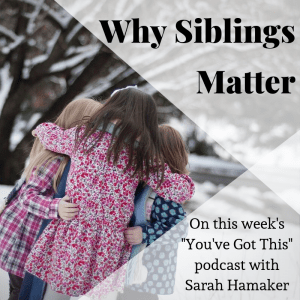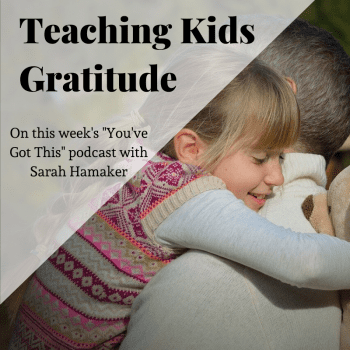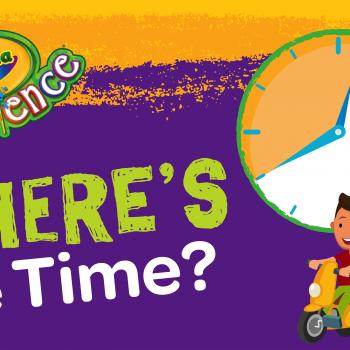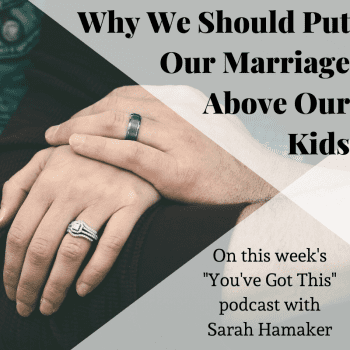
The following is an excerpt from my interview with Dr. Allison Buskirk-Cohen on my podcast, You’ve Got This.
Dr. Allison Buskirk-Cohen is the chair of the Psychology Department at Delaware Valley University, where she primarily teaches courses on lifespan development. Allison’s research focuses on how interpersonal relationships influence well-being and academic success. She has presented at numerous academic conferences around the world. Allison’s work also has been published in peer-reviewed journals and advanced textbooks. Recently, she served as the editor of the textbook, Taking Sides: Clashing Views in Lifespan Development, 7th edition, which will be available in 2020. Overwhelmingly, her research demonstrates the power of our need to connect with others.
A lot of times, we as parents look at our kids and we just see the negatives of their interactions but let’s talk about some of the positives. What’s the positive of being a sibling?
Allison: Our siblings are the people who are there with us from the beginning. Siblings can be our first playmates. Parents and caregivers are wonderful but they’re obviously on a very different age group. With siblings, you can start to build a shared history of family memories together. We also learn how to resolve conflicts because of course we’re not always going to get along with our siblings. Our arguments can help us learn how to negotiate, how to resolve conflict. There’s lots of things we can learn from our siblings.
How often do we hear kids say, “It’s not fair so-and-so gets to do this because they’re older. So-and-so gets away with that because they’re younger.” This concept of fairness is a tricky one, and siblings have to figure that out. What does fairness mean? Does fairness mean everyone gets the same thing or does fairness mean people get what they need?
When you do think parents should intervene when kids are fighting?
Allison: There’s a delicate balance of allowing kids to sort of work through it themselves versus intervening as a parent. I think one of the things to keep in mind is you know your children and you might be able to recognize signs that they’re about reach their limit before they do. There’s another teachable moment—it’s teaching children how to recognize nonverbal cues and emotional understanding from others. So, you can push your little brother only so far and then he’s at his end point. We need to teach our kids how to intervene before someone has a meltdown or before someone lashes out and throws something or knock something over or whatever the case may be.
Our job as parents is not to intervene in every squabble because with siblings, it’s a very safe place to learn how to resolve conflict, how to compromise, how to work with someone that you may not be feeling very pleased with at the time. One of the things that I step in with is when the fight moves from the general to the personal. In other words, they might be upset about something but then they start calling the sibling names. When you let those things fester and let other siblings kind of “get away” with being unkind to their sibling, that’s what can hurt a brother-sister relationship.
Allison: When you start to see conflict among kids, there’s three questions you should ask yourself. 1) Are the kids upset or is it you? Sometimes our kids might start bickering about something and it triggers a memory in us of something that happened to us when we were younger, so we might start to feel really upset by it. But maybe the kids are just bickering and it’s not that upsetting for them. If it’s really about the kids, then that’s the time to step in. If it’s more about you, then it might be a time for you to take a step back. 2) How can you model for your kids how to manage their emotions? Helping them to identify Am I mad?, Am I sad?, Am I feeling left out? Teach them to describe that and to use those words to say to their brother or sister, “When you do X, I feel sad.”
Helping them identify their own emotional feelings and to have the courage to describe them is a life skill that’s difficult for children. There’s a lot of gender expectations that go into that and it’s really important that we can help kids to take ownership over their emotions. Also, we should teach them how to respond when another person acknowledges their emotional state.
3) How can I help my kids effectively resolve this conflict? I think you hinted at that before with this idea of teaching them how to fight fairly, so not bringing up past grievances and not say, “Oh, this happened last week” or “You did this last time,” but instead sort of staying present-focused, not making it about personal name-calling and not holding grudges. If there’s a reason you’re sorry, you also have to make amends. It’s not just about saying sorry but also what are you going to do to make it right?
I love that you brought up not just saying you’re sorry but thinking about amends. One of the things that I did in our household especially when the kids were little was that they weren’t allowed just to say “I’m sorry” and walk away. They had to be very specific. They had to say, “I’m sorry for taking your truck,” for example. Then the other child had to acknowledge that they had heard their apology. I found when I made them do this , t really helped to restore the relationship faster because one was acknowledging not just that he was sorry, but that he was sorry for doing something very specific. When they named that very specific thing, it helped the other one to let go and the first one to say, “Yeah, that was really wrong.” So often we just toss off “I’m sorry” without really thinking about it, and this really helped them think because we want them to develop a strong relationship. My kids may not be best friends when they’re grown, different interests, different things but I want them to be able to enjoy one another’s company when they’re 30.
Allison: Again, keep it specific, so you’re not allowing this one particular argument to sort of grow and go off on different tangents. Also instill the idea of how can we restore this relationship. Part of that is really taking ownership over “This is something I did. It was hurtful and here is how I’m going to make it better. Here’s how I’m going to make sure this doesn’t happen again or at least I’ll do my best to try it don’t happen again.”
That so important for the sibling relationship but it’s also important as you grow and become teenagers and adults and go out into the world. We know that we’re going to have other relationships that don’t always go smoothly. We’re going to have to work with people that we may not have a lot in common with, so learning how to navigate through these kinds of bumps in the road is a critical adult tasks and really lifelong tasks. Starting early I think is really setting up your children for later success.
What about those of us who are adults with siblings? What can we do as adult siblings to kind of try to repair our relationship? Of course, I realize there is a limit to what we can do. 
Allison: I think there’s a couple different pieces here that are important to acknowledge. One is that sometimes we might have things in our past that still are sore spots for us. So reminding ourselves that there is unfortunately no time machine—we can’t go back and change any of that. Feelings are valid but our siblings aren’t responsible for how our parents parented us.
Two, you might be able to calmly discuss with your siblings what happened in the past like: “Here are some things from our past that I find upsetting. I want to acknowledge them and move forward from them.” I think the important piece is if you want to move forward, not backward.
Also, thinking about what you are looking or hoping for as an outcome. Are you hoping that you and your siblings can start having a weekly conversation? So you want to schedule a weekly phone call. Think intentionally what is it that you’re looking for out of the sibling relationship.
I love the two points that you made, Allison. One, that we’re not responsible for how our parents raised us. I think that’s so important because so often we’re just like, “Well, the youngest got away with everything.” That may be true but it’s not the youngest’s fault that the parents chose to do that. Two, that we really should instead of focusing on the positive outcomes, not the negative. We all respond better to positivity than we do to negativity.
Allison: Let’s use the holidays as an example, Maybe these are the topics you don’t want to bring up or you don’t want to discuss. What would you like to talk about? Do you want your sibling to ask you about work? Do you want your sibling to ask about your hobbies? Providing some direction, I think, can be really helpful especially when a relationship hit a rocky point. People often don’t know what to do and that sort of awkwardness and fear can become kind of overwhelming. And so if you can say, “Here are the things that I’m really hoping that we can talk about” or “Here are the things I’d really like to do with you.” So maybe sitting around and talking isn’t where you are in your relationship but maybe you could plan an activity together. “Maybe we could all go for a hike together. Maybe we could go do shopping together,” whatever sort of makes sense given your interests and other things. But again sort of focusing on what you’re looking for to happen. So again, focus on the positive.
Also when we can make those determinations ahead of those fraught times of year like Thanksgiving, December holidays, anniversaries and/or birthdays, that can really help too. For our own kids too, just helping them to focus instead of thinking about all the negative things their sibling did, I always remind them of the positive things as well to kind of balance it because I think our human nature is that we just sometimes automatically focus on the negative.
Allison: There’s been some really interesting research about that part of what makes people sort of get stuck in a depressive cycle or an anxiety cycles is that they cognitively can’t remember anything but the upsetting times and the difficult times. They simply can’t recall their memory of the good things that have happened, their positive attributes and characteristics. Having someone else point that out can be incredibly helpful.
Is there anything else that you want to mention that we can either do as parents or adult siblings to strengthen that bond between our brothers and sisters?
Allison: Remember that sibling relationships are complex, and they’re going to have ups and downs like any other relationship, whether we’re talking about children or teens or adulthood. There are just going to be certain times when we might have more in common with one another, more shared interests and we might be closer as a result of that. And then there are maybe other times where, because of other stressors going on, where we might not be as close. So cutting our children and ourselves a little bit out a break and just recognizing that if we’re in this for the long haul, we have to accept that there is going to be some ups and downs. But dedicating ourselves to the process and letting our siblings know that we’re dedicated to it as well is an incredibly important part to making sure siblings know that they are valued.
To hear more great advice and stories from Allison, listen to “Why Siblings Matter” on the “You’ve Got This” podcast.












